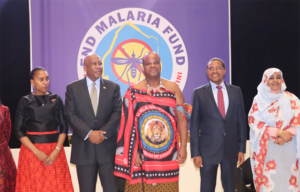 The Kingdom of Eswatini has managed to reduce malaria incidence by more than 92% from 2002 to 2016. Eswatini is one of the few African countries to have met the target set in the Millennium Development Goals (MDGs) long before the target date. The country is ranked among 21 countries globally with the potential to eliminate malaria by 2020.
The Kingdom of Eswatini has managed to reduce malaria incidence by more than 92% from 2002 to 2016. Eswatini is one of the few African countries to have met the target set in the Millennium Development Goals (MDGs) long before the target date. The country is ranked among 21 countries globally with the potential to eliminate malaria by 2020.
In 2008, with the support of a Global Fund grant, Eswatini began transitioning from malaria control to elimination with a falciparum malaria risk is classified into no risk, unstable risk of <0.1 case per 1,000 population (API) and stable risk of ≥0.1 case per 1,000 population (API). Risk was defined using health management information system data and the transmission limits were further refined using temperature and aridity data. Data from the international travel and health guidelines (ITHG) were used to identify zero risk in certain cities, islands and other administrative areas.
The Ministry of Health (MOH) recently released its National Malaria Elimination Strategic Plan 2015–2020 with the goal of accelerating progress toward elimination by the end of 2020. Further support for Eswatini’s elimination goal is generated through the country’s participation in the Elimination Eight (E8), a regional initiative composed of eight neighboring countries to address the issue of cross border transmission, wherein the four “front-line” countries embarking on malaria elimination, Botswana, Namibia, South Africa, and Eswatini coordinate their efforts with the four “second-line” countries Angola, Mozambique, Zambia, and Zimbabwe.
The malaria elimination drive in the Kingdom of Eswatini is also championed by His Majesty King Mswati III, who recently launched the End Malaria Fund, 31st May 2019. His Majesty the King, is currently chairperson for the African Leaders Malaria Alliance (ALMA), which is an initiative aimed at mobilising sustainable domestic resources for malaria elimination in the Kingdom, the region and the entire African continent.
Through the implementation of the National Malaria Elimination Strategy (2016-2020), Eswatini has made significant strides towards eliminating malaria. The government of Eswatini puts about 70% of the resources for the implementation of Malaria elimination interventions. The government provides all malaria diagnosis and treatment services to everyone free of charge in all health facilities including the private sector. The Government also ensures that anti-malaria drugs are always available in all health facilities. All households in malaria at risk areas are sprayed once a year with residual insecticides and a high spray coverage of up to 90% is maintained. The country also has a surveillance system that helps to map out specifically all confirmed malaria cases and all interventions delivered in each household. This has helped the country to understand in real time what is happening and where.
The Kingdom has further invested a lot of resources in the area of research to ensure that the strategic direction of the programme is always informed by scientific evidence. Government also continues to conduct research on the drugs and insecticides to ensure that they are still effective against the mosquito and parasites.
Further, Eswatini is one of seven countries implementing the AFRO II Integrated Vector Management (IVM). The project provides for an opportunity to conduct effectiveness and feasibility studies of other vector control interventions that can contribute to the effort of malaria elimination and help to maintain this malaria-free status in the post elimination period under the local circumstances.
